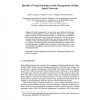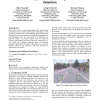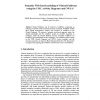564 search results - page 67 / 113 » Knowledge Representation with Autonomic Ontologies |
HSNMC
2004
Springer
14 years 1 months ago
2004
Springer
Network management is an area where many different technologies coexist. Several languages are used to define the information to be managed, which are specific of each management m...
AIME
1997
Springer
13 years 12 months ago
1997
Springer
: Clinical guidelines reuse existing clinical procedural knowledge while leaving room for flexibility by the care provider applying that knowledge. Guidelines can be viewed as gene...
CIKM
2005
Springer
14 years 1 months ago
2005
Springer
Our previous work on road detection suggests the usage of prior knowledge in order to improve performance. In this paper we will explain our motivation for a novel approach, defin...
AIME
2009
Springer
13 years 8 months ago
2009
Springer
: Clinical Pathways can be viewed as workflows, comprising an ordering of activities with associated execution constraints. Workflow models allow formal representation, analysis an...
AAMAS
2000
Springer
13 years 7 months ago
2000
Springer
We adopt the decision-theoretic principle of expected utility maximization as a paradigm for designing autonomous rational agents, and present a framework that uses this paradigm t...



